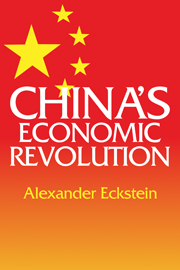Book contents
- Frontmatter
- Contents
- List of tables
- Preface
- 1 The economic heritage
- 2 Development strategies and policies in contemporary China
- 3 Property relations and patterns of economic organization in China
- 4 The resource-allocating system
- 5 The quest for economic stability
- 6 Economic development and structural change
- 7 The role of foreign trade in China's economic development
- 8 The Chinese development model
- Notes
- Index
7 - The role of foreign trade in China's economic development
Published online by Cambridge University Press: 28 October 2009
- Frontmatter
- Contents
- List of tables
- Preface
- 1 The economic heritage
- 2 Development strategies and policies in contemporary China
- 3 Property relations and patterns of economic organization in China
- 4 The resource-allocating system
- 5 The quest for economic stability
- 6 Economic development and structural change
- 7 The role of foreign trade in China's economic development
- 8 The Chinese development model
- Notes
- Index
Summary
The gains from trade
As shown in the preceding chapter, China's economic growth since 1949 has been very impressive by the standards of China's past development and compared with the pace of expansion of presently industrialized countries in the nineteenth century. It has also been quite rapid, although not exceptional, in comparison with the post-war growth tempo of other underdeveloped countries. It is evident that in terms of two major criteria – stability, analyzed in Chapter 5, and growth, examined in Chapter 6 – the performance of the Chinese economy must be rated highly for the last quarter century.
Foreign trade has played a marginal but very significant role both in maintaining stability and in contributing to growth. Grain imports during the agricultural crisis years of the early 1960s helped to alleviate food shortages, particularly in the cities. Thereby they also helped to contain inflationary pressures, especially at that time, but since then as well. Imports of machinery, transport equipment, complete plants, and other capital goods fostered China's industrialization, modernization, and technological progress, and in this way contributed to China's economic growth. The course and changing structure of foreign trade can also serve as a very useful indicator of stability and growth in ways that will be explored in this chapter.
Before proceeding with this analysis, one needs to ask why do countries engage in international trade. Are there gains from trade? International trade clearly creates greater dependence on the rest of the world. Does it also yield substantial benefits and, if so, what are these?
Significant potential gains accrue to an economy that takes advantage of the international division of labor and specialization across national boundaries.
- Type
- Chapter
- Information
- China's Economic Revolution , pp. 233 - 276Publisher: Cambridge University PressPrint publication year: 1977



